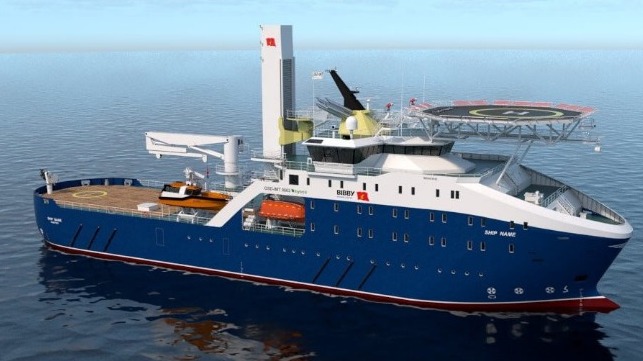UK Effort Plans First Electric SOV in Offshore Decarbonization Race

A coalition of leading maritime companies led by Bibby Marine and with financial support from the UK plans to develop the first zero-emission electric Service Operation Vessel (eSOV) to be used to support the offshore wind and energy industry. It is the latest entrant in the race to develop the first zero-emission vessels with a focus on the offshore sector and the potential of using power at the wind farms to charge the ships.
In their application for the UK’s Zero Emission Vessel Infrastructure (ZEVI) competition, the coalition points to the strong opportunities in the segment to support offshore wind operations. With the UK calling for 40 GW offshore wind energy in additional offshore wind energy capacity by 2030 expanding on the more than 10 GW already in operation, the group estimated that between 62 and 149 vessels will be required. They highlighted that all the UK-operating SOVs have so far been built aboard.
They are proposing a 295-foot vessel that would be primarily powered by electricity and batteries and have dual-fuel methanol-powered engines as backup. The ship will be ready for offshore charging and can recharge its batteries at night.
They expect that it will be possible to operate a two-week cycle onsite at an offshore wind farm emissions-free. Near shore the vessel will operate solely on battery power and also while onsite. For the long transits between the shore homeports and the farms, the vessel will use its engines and with methanol fuel, it would be possible to still reduce emissions by 90 percent versus fossil fuel operations. They noted in the application if offshore charging is not available, the vessel would use its methanol engines to recharge its batteries and would still achieve a 50 percent reduction in emissions compared to a conventional SOV.
DNV, which is one of the members of the coalition notes, “The number of fully electric and hybrid vessels will surge over the next few years, and continuing development on these technologies will be a key part of the maritime industry’s transition to a zero-carbon future.”
Bibby, which is leading the effort notes the vessel will be a natural progression in its decarbonization effort and the first new vessel for Bibby Marine in five years.
It was one of five projects that was announced today at London International Shipping Week as a winner in the UK Government’s competition designed to support the development of new zero-emission maritime technologies. Under the rules of the competition, the vessel needs to be in service by 2025.

that matters most
Get the latest maritime news delivered to your inbox daily.
They are estimating a cost of $37.5 million for the project with the UK government awarding them $25 million in funding. The project participants include Bibby Marine, Port of Aberdeen, Offshore Renewable Energy (ORE) Catapult, Kongsberg, DNV, Shell, and Liverpool John Moores University.
In the previous rounds of the funding competition, the UK has also awarded support to projects seeking to develop the technology required to provide offshore recharging capabilities. It has been highlighted that one of the challenges is the increasing distance from shore for the location of the wind farms, making onsite recharging critical. The UK projects are one of several looking at offshore recharging and creating vessels that are fully electric or use other technologies to be zero-emission ships.
